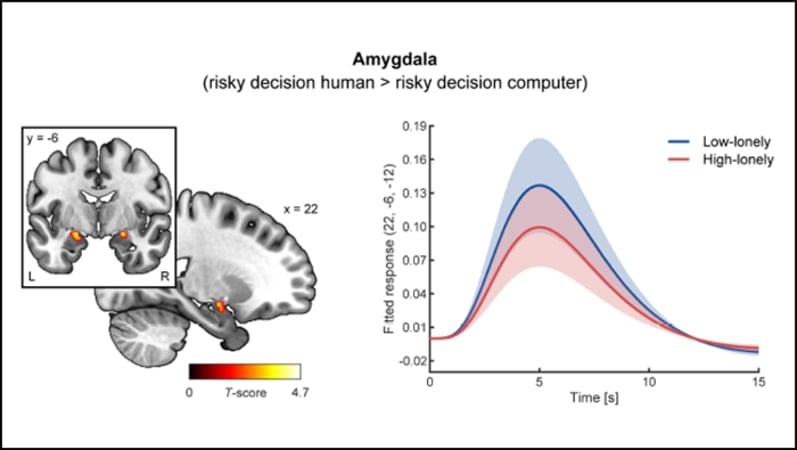Summary: People with social anxiety have increased amygdala activity during social decision making, and reduced activity in the nucleus accumbens during social feedback. Those who are lonely did not experience the same alterations as those with social anxiety, suggesting loneliness is a unique condition.
Source: SfN
Despite similar symptoms, loneliness and social anxiety are driven by different brain states, according to new research published in Journal of Neuroscience.
Loneliness can have detrimental consequences on physical and mental health, yet there are currently few behavioral interventions for loneliness like there are for other conditions.
Lieberz et al. explored the basis for these two conditions by comparing how people with social anxiety and high and low loneliness behaved in a social gambling task.
Participants played a computer game where they could make a safe bet and win a smaller amount of money or make a riskier bet for a larger sum. If they took the riskier bet, they watched a video of a virtual human showing approval or disapproval.

People with social anxiety took the safe bet more often to avoid social feedback from the videos. But people with high loneliness did not display this social avoidance.
By measuring the participants’ brain activity during the task with fMRI, the researchers found people with social anxiety displayed increased amygdala activation during the decision phase — a sign of heightened anxiety — and reduced nucleus accumbens activation during the feedback phase — a sign of reduced social reward.
Neither activity pattern appeared in people with high loneliness, indicating loneliness is a unique condition requiring its own interventions.
About this social anxiety and loneliness research news
Author: Calli McMurray
Source: SfN
Contact: Calli McMurray – SfN
Image: The image is credited to Lieberz et al., JNeurosci 2021
Original Research: Closed access.
“Behavioral and neural dissociation of social anxiety and loneliness” by Lieberz et al. Journal of Neuroscience
Abstract
Behavioral and neural dissociation of social anxiety and loneliness
Loneliness is a public health concern with detrimental effects on physical and mental well-being. Given phenotypical overlaps between loneliness and social anxiety (SA), cognitive-behavioral interventions targeting SA might be adopted to reduce loneliness. However, whether SA and loneliness share the same underlying neurocognitive mechanisms is still an elusive question.
The current study aimed at investigating to what extent known behavioral and neural correlates of social avoidance in SA are evident in loneliness.
We used a pre-stratified approach involving 42 (21 females) participants with high loneliness (HL) and 40 (20 females) participants with low loneliness (LL) scores. During functional magnetic resonance imaging, participants completed a social gambling task to measure the subjective value of engaging in social situations and responses to social feedback. Uni- and multivariate analyses of behavioral and neural data replicated known task effects.
However, although HL participants showed increased SA, loneliness was associated with a response pattern clearly distinct from SA. Specifically, contrary to expectations based on SA differences, Bayesian analyses revealed moderate evidence for equal subjective values of engaging in social situations and comparable amygdala responses to social decision-making and striatal responses to positive social feedback in both groups.
Moreover, while explorative analyses revealed reduced pleasantness ratings, increased striatal activity, and decreased striatal-hippocampal connectivity in response to negative computer feedback in HL participants, these effects were diminished for negative social feedback.
Our findings suggest that unlike SA, loneliness is not associated with withdrawal from social interactions. Thus, established interventions for SA should be adjusted when targeting loneliness.
SIGNIFICANCE STATEMENT
Loneliness can cause serious health problems. Adapting well-established cognitive-behavioral therapies targeting social anxiety might be promising to reduce chronic loneliness given a close link between both constructs. However, a better understanding of behavioral and neurobiological factors associated with loneliness is needed to identify which specific mechanisms of social anxiety are shared by lonely individuals.
We found that lonely individuals show a consistently distinct pattern of behavioral and neural responsiveness to social decision-making and social feedback compared to previous findings for social anxiety. Our results indicate that loneliness is associated with a biased emotional reactivity to negative events rather than social avoidance.
Our findings thus emphasize the distinctiveness of loneliness from social anxiety and the need for adjusted psychotherapeutic protocols.







